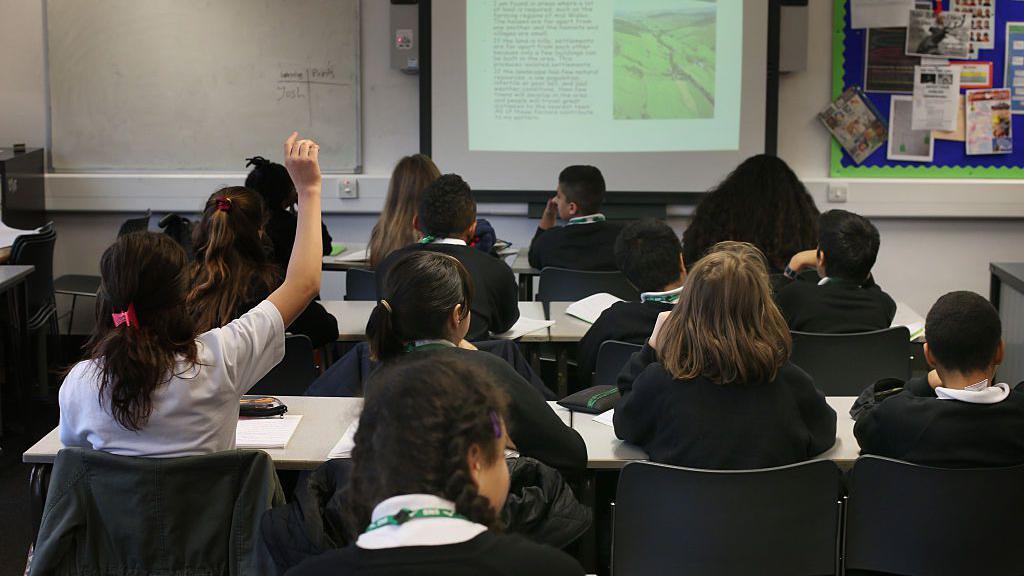Falling pupil numbers see London hit hardest

There has been a sharp decline in pupil numbers since the "post-millennium baby boom", the report found
- Published
The number of pupils in primary schools in London is continuing to fall sharply as a low birth rate coupled with families moving away from the capital is starting to take effect, a report has found.
Since 2019 there has been a drop of 150,000 pupils according to analysis by the Education Policy Institute (EPI) which predicted a further 400,000 drop of pupils in schools in England by the end of the decade.
Nine of the 10 local authorities seeing the largest drops across the country are in London, it said, with the inner boroughs seeing the biggest change.
Schools are funded on a per-pupil basis meaning falling pupil numbers are a big concern as large declines are associated with school closures.
According to the independent think tank, Westminster saw an almost 16% fall in primary pupil numbers from 2020-21 to 2024-25, while in Southwark, figures have fallen by more than 12% in five years and the number of primary schools has dropped by six.
About 17% of primary pupils in reception in 2012-13 had left the city by Year 6, increasing to 20% for pupils who started reception in 2017-18, the report found.
In order, the 10 local authority areas with the largest falls in primary pupil numbers over the last five years are: Westminster, Lambeth, Southwark, Hackney, Camden, Hammersmith and Fulham, Islington, Merton, Wandsworth, and Redcar and Cleveland in North Yorkshire.
'Leaving the country'
Jon Andrews, head of analysis and director for school system and performance at the EPI, told BBC Radio 4's Today programme there had been a "post-millennium baby boom" since 2010 and up to 2012, however that had "turned around and has been in decline since then".
"But the issue in London looks to be more complicated than that," he said.
"There is evidence of children moving out of the capital to neighbouring local authorities, but also leaving the state system altogether - so that's maybe because they go into independent schools, more likely it's because they're leaving the country."
He said the way funding was allocated largely related to how many pupils that were on roll and the costs did not necessarily fall in the same way as funding does.
He added it costs the same to educate a class of 25 as it does a class of 30, but "if you're losing five pupils that could mean a fall in your school budget of around £30,000-£40,000".
"Schools are having to educate or offer the same classes and the same curriculum but on a lower budget, and what we may see is schools starting to cut back on their staff, particularly among school staff, (and) cut back on kind of extracurricular provision and the curriculum more generally."
More primary schools to merge as birth rates fall
- Published3 July
London school dating back to 1500s to close
- Published18 July
Decline in London school pupil numbers to continue
- Published18 February
The National Association of Head Teachers (NAHT) said the findings confirmed "what school leaders have been experiencing on the ground".
Its general secretary, Paul Whiteman, said "unpredictable pupil demographic changes are making long-term school place planning increasingly difficult".
"We need a joined-up strategy that puts pupils and communities first, avoiding the temptation to take knee-jerk, reactive decisions that undermine stability.
"Rather than reducing funding or closing schools, we would urge the government to continue to invest and support local authorities to maintain staffing and resources."
'Repurpose spare space'
Earlier this year, former education secretary Conservative MP Damian Hinds called for school funding to no longer be judged on a per-pupil basis because of falling rolls.
He said the decline in pupils meant the per-pupil basis was no longer a good reflection of whether funding was increasing or decreasing.
A Department of Education spokesperson said it recognised the "pressures caused by demographic changes".
"Our system is designed to give schools more certainty over funding levels so they can plan ahead.
"Per-pupil funding for schools is currently at record levels, increasing to £69.5bn by 2028-29.
"As part of our wider work to give children the best start in life, we have awarded 300 primary schools £37 million to repurpose their spare space, with schools now providing over 5,000 new childcare places, as part of our school-based nurseries roll out."
Listen to the best of BBC Radio London on Sounds and follow BBC London on Facebook, external, X, external and Instagram, external. Send your story ideas to hello.bbclondon@bbc.co.uk, external
Get in touch
Have you been affected by issues discussed in this story? Share your experiences.